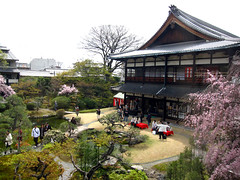 |
| Inside the Gion Kobu Kaburenjo's garden by CLF /flickr |
The MIYAKO ODORI(Cherry-Blossom Dance, Cherry Dance) is being held from April 1st to 30th at Gion Kobu Kaburenjo(祇園甲部歌舞練場, Gion Kobu's Dance Performance Theatre) in Kyoto. Tourists have an opportunity to see many geiko and maiko only during this annual event.
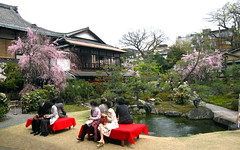 |
| Inside the Gion Kobu Kaburenjo's garden by CLF /flickr |
Its ticket are also available by phone/fax.
The official site of MIYAKO ODORI presents information in English and Japanese.
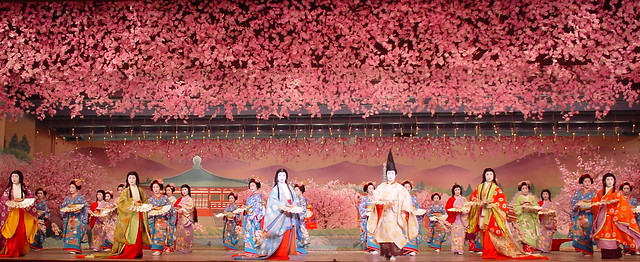 |
| Miyako Odori by Joi /flickr |
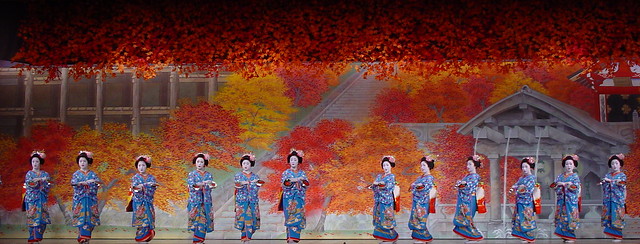 |
| Maiko at Miyako Odori by Joi /flickr |
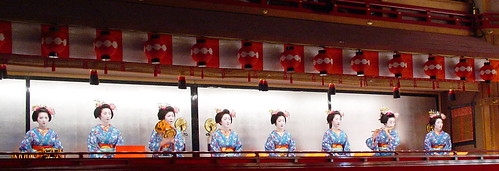 |
| Maiko at Miyako Odori by Joi /flickr |
paper lantern
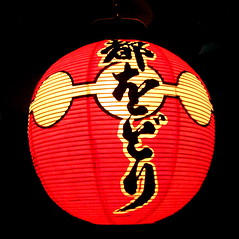
by CLF /flickr
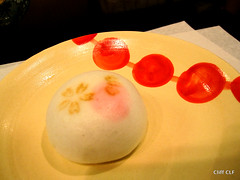 |
| the sweet dumpling that is eaten before the matcha tea is served by CLF /flickr |
Special-Class-Ticket bueyers can enjoy traditional Japanese tea service and get complimentary gift.
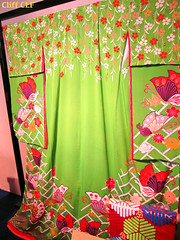 |
| Kimono for Miyako Odori - past by CLF /flickr |
When a Kyotoite says 'Bubuzuke demo doudosu?(Would you like a bowl of ochazuke?),' one doesn't mean it. One says in a roundabout way, "I need you to leave."
(Ochazuke is boiled rice with tea or soup poured over it.)
This is a famous joke in one of Rakugo(comic storytelling) stories, but it accurately depicts the character of Kyoto citizens.
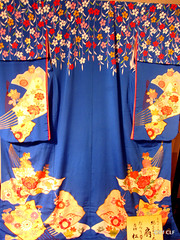 |
| Kimono for Miyako Odori - past 2000 by CLF /flickr |
Many long-term citizens hate to make trouble, so they don't say things directly. They make a complaint or say no indirectly. It's hard for non-Kyotoites to understand! Not all of Kyoto citizens do so. Younger Kyoto citizens tend to say directly what are on their minds. Surprisingly, Kyoto citizens are also novelty-loving people.
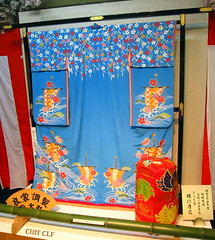 |
| Kimono for Miyako Odori 2012 by CLF /flickr |
Kyoto was the previous capital of Japan. Emperors stayed there for over 1,000 years.
The city has withstood earthquakes, fires, political turmoil, wars, and the relocation of the capital. Meanwhile, Kyoto has been one of the most popular tourist cities for over 1,000 years. Kyoto people are kind towards tourists, and are shrewd in business.
Some people say that shops in Kyoto have a fifty-fifty relationship with customers andmany of them choose customers. In Kyoto, not all rich people can get excellent service.
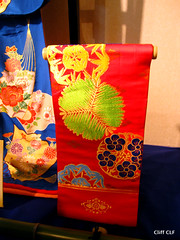 |
| Kimono for Miyako Odori - past by CLF /flickr |
Many of traditional local festivals come from traditional folk customs and events, religious events in Buddhism or Shintoism. They are for local people, but recently they tend to be regarded as attractive events for tourist. In some festivals such as "Owara Kaze no Bon" in Toyama Prefecture, local people value their festivals, but they are overwhelmed by an increasing number of tourists. Kyoto is keeping balance between religious events and tourism business.
Long-term citizens value traditions and form a very exclusive society. Even members of families living in Kyoto since their grandfather's generation can be regarded as newcomers by them.
My mother has a friend living in Tokushima. She came to Kyoto with her husband when he was transferred there. My mother heard from her that it was not easy living in Kyoto.
No comments:
Post a Comment